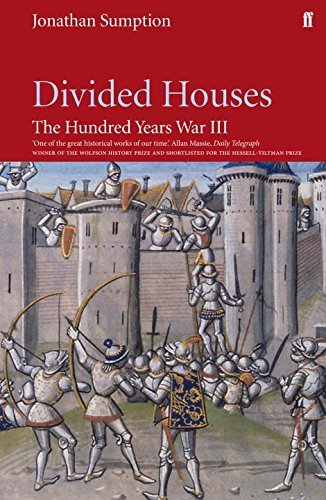Divided Houses
 The third book of Sumption’s history of The Hundred Years War continues the excellent job of the first two. This one is less “sexy” than the others as none of the famous battles fall in the thirty year period of this book (1369-1399).
The third book of Sumption’s history of The Hundred Years War continues the excellent job of the first two. This one is less “sexy” than the others as none of the famous battles fall in the thirty year period of this book (1369-1399).
There are a couple of battle in here, the most prominent of which is Aljubarrota (1385), where a Castilian army managed to march around an allied English/Portuguese army, and hit it from behind, and still lost heavily. I’d definitely like to see a treatment of this one in Men of Iron. It’s only one of about two set-piece battles, and they’re much smaller than the great clashes you mostly hear about.
Mostly, the book is given to the slow grind of warfare between two powers short on cash. The French overrun much of Aquitaine near the start of this period because the English just couldn’t get the cash to pay for an army to stop them. However, this grinds to a halt from a combination of running out of money and political will. The theme, as much as a history like this can have one, is reflected well in the title: both sides have deep internal divisions that sap their ability to wage a war to the finish.
In both cases this is largely a result of change of generations. The Black Prince falls ill and dies over the course of a few years, and is followed by Edward III, leaving the government in the hands of his brothers and Richard II. The latter is not a horrible king, but is not a strong or wise one, which is not a workable combination with a nation in a war with a larger neighbor. The book basically ends with him deposed in favor of Henry IV.
Meanwhile Charles V dies in 1380, leaving the throne of France to his eleven-year-old son, Charles VI. Similar to England, his uncles take over much of the administration of France, and war aims get diverted to personal pet projects. Worse, after taking the reigns of government, he goes mad, suffering a psychotic break in 1392, with frequent relapses. The unpredictability of these bouts leaves France rudderless again while still at war.
During this period, both sides suffer peasant rebellions caused by taxation for war expenditures. Both are put down, and France eventually exerts control over taxation again, while England continues to need Parliamentary grants, but it’s clear signal that this can’t go on. Castilian finances also collapse after a few years of heavy taxation, causing peace to be the only practical solution.
So one of the major themes of the book, especially in the second half is the continual search for a peace that both sides can live with. The problem is the root issues of the war have yet to be resolved, and when the competing claims are for England to give up all its extensive possessions in France, or for France to give up claims to sovereignty in its own territory, there’s a big gap to be bridged. So there is a series of truces, peace conferences, and outside arbitration trying to find a way to resolve the irresolvable. Overall, Richard II was seen leaning heavily towards peace, and the crowning of Henry IV was seen as a disaster in France because he was obviously a creature of the war party. (Tune in next time for Cursed Kings….)

Discussion ¬